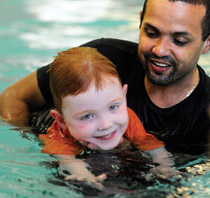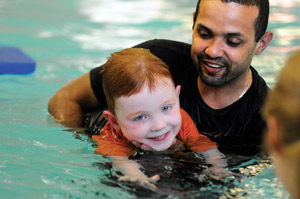Bulletin News

08/19/2010
SUNY Cortland’s Physical Education Department recently was awarded a $6,000 Quality of Life/Actively Achieving grant from the Christopher and Dana Reeve Foundation to support a model program aimed at helping children born with a spinal developmental defect to realize their full physical potential.
Infants born with spina bifida, a neural tube birth defect that often requires intensive medical intervention, often develop motor skills at a slower rate than their non-disabled peers. Parents are often warned against encouraging physical activity as their child grows and health stabilizes.
“Traditionally, medical doctors tend not to recommend physical activities for some children with physical disabilities,” said Luis Columna, an assistant professor of physical education at the College and author of the successful grant application.
As a result, most youth with spina bifida lose out on a typical childhood of swimming pools, sandboxes, playgrounds and ball fields.
For the last four years, three SUNY Cortland Physical Education Department faculty members have collaborated with SUNY Upstate Medical University medical faculty to create a model program titled “Fit Families Group Visits: Physical Activity and Medical Services for Children with Spina Bifida and their Families.” Columna subsequently developed a grant to address the cultural needs of Hispanic children and their families with spina bifida.
“Now the doctors are recommending physical education for everybody, for all their patients,” Columna said.
The researchers in the special clinic work with small cohorts of children — as well as their families, medical providers and professional consultants — to realize the natural inclination of youngsters to move freely, frolic and play games with other tots.
Associate Professors Timothy Davis and John Foley and Assistant Professor Columna, all of whom specialize in adapted physical education, have worked closely with two pediatricians who are faculty at SUNY Upstate Medical University, Associate Professor and Spina Bifida Medical Center Director Nienke Dosa and Professor Gregory Liptak, and SUNY Cortland students to enrich a holistic model of inclusion for children with disabilities in adapted physical education.
 |
| Matthew, left, a child whose health issues make exercise a challenge, practices his swimming stroke with “coach” Luis Columna, a member of SUNY Cortland’s Physical Education Department faculty, as part of a pilot exercise program at SUNY Upstate Medical University’s Institute for Human Performance. Photo by Stephanie Makosky |
“What we provide is not a traditional model,” said Columna, who obtained the grant on behalf of the research team. “Instead of the parents going to the office of the doctors, the families meet in just one place, at Upstate Medical University. Ten or 15 families at one time meet with doctors, social workers, physical therapists and physical educators.
“We also are involved in providing physical education to the kids,” he said. “Most of the activities are led by graduate or undergraduate students who are involved as part of a service learning experience through different adapted physical education courses. Every month we have a different activity theme for the children. At the end of the month, we teach the activity to the parents so that, winter or summer, the adults know how they can play with their kids, and they know what their child can do.”
Columna said the grant will underwrite the cost to create an English-language DVD that can be shared with other spina bifida clinics. It also will offset the expense for the researchers to share their findings more widely at an international conference.
“We decided to apply for this grant so we could promote our program to other spina bifida centers,” said Columna, who will be promoted to the rank of associate professor this fall.
The goal is to recruit about one-third Latino children for the program.
“This will not only help a group often overlooked but will assist us in the production of a Spanish-language DVD,” Columna said.
The Quality of Life/Actively Achieving grant is funded through a cooperative agreement with the Centers for Disease Control and Prevention.
Created by the late Dana Reeve in 1999, the Reeve Foundation’s Quality of Life Grants are awarded twice a year to nonprofit organizations that provide services and programs to individuals living with paralysis. Columna’s project was among 75 nonprofit organizations in the U.S. and Canada to receive a total of $520,000 to improve opportunities, access and day-to-day quality of life for families and individuals living with disabilities under this round of Reeve Foundation grants. Nearly 1,600 grants totaling almost $13 million have been awarded to organizations since the program’s inception.
“The Quality of Life program that Dana Reeve created 11 years ago is based on freedom,” said Peter T. Wilderotter, president and CEO of the Christopher & Dana Reeve Foundation. “We are happy to be able to support SUNY Cortland to create more independence, increase opportunities, and provide support for those living with paralysis along with their families and caregivers.”
The children with spina bifida and their families participate in educational activities, medical services and social programming at Upstate Medical University, Columna noted. Services are designed to improve the emotional, social and physical well being of the participants.
“We know the basic characteristics of the disability we are working with,” he said. “But each child is unique. Not all kids are able to do what other children can do. So we do an informal assessment to see what they can or cannot do. And from that we may modify their activity. This is not a ‘one size will fit everybody’ approach. We need to be open-minded that you are going to have 10 kids of about the same age at different ability levels; the time of moral, social and physical development is all going to be different.”
The model program provides families with educational seminars for parents on topics that improve awareness, advocacy and access to community services; inclusive games and modified sports for children and siblings; individual consultations with medical and physical activity professionals; and opportunities for social networking for families participating in the program.
Columna tells a story of how a parental seminar helped one parent begin to address problems and inequities in her child’s educational experience.
“I was once telling the group of parents how they had the right to physical education for their children,” Columna said. “So the next day, one parent sent me an e-mail that she went ahead and contacted the director of physical education at her child’s school to find out the qualifications of the P.E. teacher. Everything we told her she went ahead and did, literally the next day. We never had that happen before. We empowered them.”

